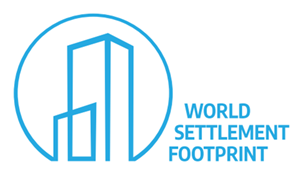Abstract:
The World Settlement Footprint (WSF®) 2019 is a 10m resolution binary mask outlining the extent of human settlements globally derived by means of 2019 multitemporal Sentinel-1 (S1) and Sentinel-2 (S2) imagery.
Based on the hypothesis that settlements generally show a more stable behavior with respect to most land-cover classes, temporal statistics are calculated for both S1- and S2-based indices. In particular, a comprehensive analysis has been performed by exploiting a number of reference building outlines to identify the most suitable set of temporal features (ultimately including 6 from S1 and 25 from S2). Training points for the settlement and non-settlement class are then generated by thresholding specific features, which varies depending on the 30 climate types of the well-established Köppen Geiger scheme. Next, binary classification based on Random Forest is applied and, finally, a dedicated post-processing is performed where ancillary datasets are employed to further reduce omission and commission errors. Here, the whole classification process has been entirely carried out within the Google Earth Engine platform. To assess the high accuracy and reliability of the WSF2019, two independent crowd-sourcing-based validation exercises have been carried out with the support of Google and Mapswipe, respectively, where overall 1M reference labels have been collected based photointerpretation of very high-resolution optical imagery.
The dataset is organized in 5138 GeoTIFF files (EPSG 4326 projection) each one referring to a portion of 2 x 2 degree size (~222 x 222 km) on the ground. Settlements are associated with value 255; all other pixels are associated with value 0.
A comprehensive publication with all technical details and accuracy figures is currently being finalized. For the time being, please refer to Marconcini et al,. 2021.
Keywords:
DLR, EOC, WSF, 2019, urbanization, land, global settlement extent, Sentinel-1, Sentinel-2, Copernicus
Map Projection:
Bounds: -180.00, -60.00, 180.00, 78.00
Related Datasets



